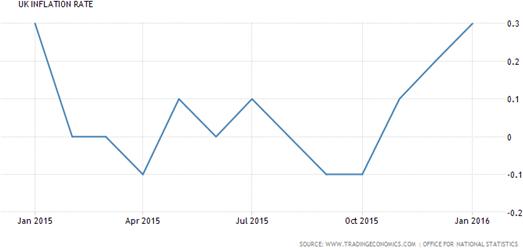As the market is still recovering from the turmoil of the surprise ECB rate cut last week, it readies itself for the impending Bank of England (BOE) announcement which will confirm its own interest rate this week. While earlier predictions hinted that the BOE might raise its historically low rates, following the example set by the US Federal Reserve, it now looks as though an increase is some way off. With increased dovish talk emanating from the BOE and the deterioration of economic conditions for the UK, the decision to continue with the rate will be no real surprise.
With deflationary pressures a real concern, the bank can scarcely justify reducing credit availability and hampering its already sluggish economy. Without the additional increase in consumption that low interest rates prompt through cheap credit,even slower GDP growth becomes a likely scenario. Compounding the issue is the subdued wage rate growth, which at only 2% has been less than expected at the given rate of inflation.Reduced wage growth becomes problematic as this prevents higher degrees of domestic consumption, which stalls economic growth. Additionally, an increase in deflation from the rate hike will likely be accompanied by an increase in unemployment which is never a desirable outcome.
A rate hike will also serve to appreciate the GBP. This reduces foreign consumption in the UK as a high GBPreduces British export competiveness in the global market. It also incentivises British consumers to look for foreign produced goods as they become relatively cheaper than domestic alternatives. With talk of the “Brexit” bringing concerns over access to its largest export market, the BOE can’t risk adding another barrier to exporters by encouraging a prohibitively high value of the GBP.
While the BOE faces strong incentives to avoid a rate hike, it has equally strong incentive to avoid a rate cut. While a rate cut could stimulate GPD growth by giving greater access to credit and promoting consumption, both from domestic consumers and those abroad. However, in devaluing the currency aggressively they could run the risk fuelling a currency war against both Japan and China. Both China and Japan are currently aggressively attempting to battle poor economic growth through monetary intervention.Additionally, by reducing the already historically low rate the UK may end up facing the same predicament as Japan. Japan has effectively been forced to adopt negative interest rates as it ran out of monetary policy tools. The verdict is still out on the efficacy of these negative rates in the stimulation of consumption and by extension GDP.
In essence, the BOE faces an impossible set of outcomes. If it raises rates it risks increasing deflation and further stalling GDP growth in an already troubled global environment. If it cuts rates it then has to contend with the very real outcome that it is not enough to stimulate consumption and disarms one of its main policy tools, this all while risking a currency war with China and Japan. Its final option is to simply do nothing and hope the economic environment improves to a point where its policy tool can once again be effective. In this case it is likely that the last option is the only feasible choice available to the BOE, no rate changes are likely to be on the horizon.
Risk Warning: Any form of trading or investment carries a high level of risk to your capital and you should only trade with money you can afford to lose. The information and strategies contained herein may not be suitable for all investors, so please ensure that you fully understand the risks involved and you are advised to seek independent advice from a registered financial advisor. The advice on this website is general in nature and does not take into account your objectives, financial situation or needs. You should consider whether the advice is suitable for you and your personal circumstances. The information in this article is not intended for residents of New Zealand and use by any person in any country or jurisdiction where such distribution or use would be contrary to local law or regulation. Knight Review is not a registered financial advisor and in no way intends to provide specific advice to you in any form whatsoever and provide no financial products or services for sale. As always, please take the time to consult with a registered financial advisor in your jurisdiction for a consideration of your specific circumstances.
Recommended Content
Editors’ Picks
EUR/USD edges lower toward 1.0700 post-US PCE

EUR/USD stays under modest bearish pressure but manages to hold above 1.0700 in the American session on Friday. The US Dollar (USD) gathers strength against its rivals after the stronger-than-forecast PCE inflation data, not allowing the pair to gain traction.
GBP/USD retreats to 1.2500 on renewed USD strength

GBP/USD lost its traction and turned negative on the day near 1.2500. Following the stronger-than-expected PCE inflation readings from the US, the USD stays resilient and makes it difficult for the pair to gather recovery momentum.
Gold struggles to hold above $2,350 following US inflation

Gold turned south and declined toward $2,340, erasing a large portion of its daily gains, as the USD benefited from PCE inflation data. The benchmark 10-year US yield, however, stays in negative territory and helps XAU/USD limit its losses.
Bitcoin Weekly Forecast: BTC’s next breakout could propel it to $80,000 Premium

Bitcoin’s recent price consolidation could be nearing its end as technical indicators and on-chain metrics suggest a potential upward breakout. However, this move would not be straightforward and could punish impatient investors.
Week ahead – Hawkish risk as Fed and NFP on tap, Eurozone data eyed too

Fed meets on Wednesday as US inflation stays elevated. Will Friday’s jobs report bring relief or more angst for the markets? Eurozone flash GDP and CPI numbers in focus for the Euro.
